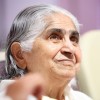On November 16, 1995 the member states of UNESCO proclaimed and signed the “Declaration of the Principles of Tolerance”. In order to generate public awareness, emphasise the dangers of intolerance, and react with renewed commitment and action in support of tolerance promotion and education, November 16 was declared as the International Day of Tolerance.
UN International Day of Tolerance events
1995 was also the year the UN celebrated its 50th anniversary. As the Brahma Kumaris thought how best to contribute to the UN50, the organization concluded that it was best to bring together thoughts on the various values on which a better world and a better United Nations must be based. Living Values: A Guidebook was published to commemorate this milestone of the United Nations. (Living Values: A Guidebook: Gayatri Naraine)
Living Values — in adopting the tenet in the Preamble of the Charter of the United Nations — focuses on ‘reaffirming faith in the dignity and worth of the human person.’ Within that active growth process, the individual can uncover a capacity to stretch beyond the limits of current reality and recognize his or her full potential, not only in relation to the self but also to the wider world. The 12 higher values described — Cooperation, Freedom, Happiness, Honesty, Humility, Love, Peace, Respect, Responsibility, Simplicity, Tolerance and Unity — are core values fundamental to the well being of humanity as a whole.
To define and clarify the meaning of tolerance, UNESCO has described 4 secular principles which are included in the ‘Declaration on the Principles of Tolerance’. As a contribution to the rich ongoing conversations on tolerance, the double helix of integrating the secular with the spiritual is offered below. Using the 4 principles we have juxtaposed these 4 principles with the ‘Living Values’ spiritual principles. The combination of this juxtaposition of inspiration, profundity, simplicity, and practicality is a compelling and powerful one.
TOLERANCE is respect, acceptance and appreciation…
Secular Principle:
* Tolerance is respect, acceptance and appreciation of the rich diversity of our world’s cultures, our forms of expression and ways of being human. It is fostered by knowledge, openness, communication and freedom of thought, conscience and belief. Tolerance is harmony in difference. It is not only a moral duty, it is also a political and legal requirement. Tolerance, the virtue that makes peace possible, contributes to the replacement of the culture of war by a culture of peace.
Spiritual Principle:
= The world — our extended family of people — can be depicted as a large tree with many limbs, branches, and shoots. Each nation — represented by a limb — is a brother or a sister having families of their own. Those families — represented by the branches — are the various provinces and communities made up of all religions and ethnic groups. When the roots of history are seen by placement of family members on such a genealogical tree, that perspective shows complementary among all people and demonstrates that coexistence is possible. Since the tree takes sustenance from common, original roots which grew from one seed, the human family tree can be no different. Coexistence stems from the very seed from which life sprang! And tolerance, which also develops from that one seed, not only has roots which run deep and which sustain, but also expresses itself in other diverse ways, including enriching the soil and providing showers of acceptance and support.
TOLERANCE is an active attitude…
Secular Principle:
* Tolerance is not concession, condescension or indulgence. Tolerance is, above all, an active attitude prompted by recognition of the universal human rights and fundamental freedoms of others. In no circumstance can it be used to justify infringements of these fundamental values. Tolerance is to be exercised by individuals, groups and States.
Spiritual Principle:
= The seed of tolerance, love, is sown with an attitude of compassion and care. The more one becomes loving and shares that love, the greater the power in that love. When there is lack of love, there is lack of tolerance. For instance, take the example of mother and child. When an obstacle comes to a child, because the mother has love for that child, she is prepared to and has the power to tolerate anything. At that time, she does not worry about her own well-being but uses love to confront all circumstances. To learn tolerance, family is the first classroom; school is the second classroom; and community is the third classroom. In all three, there is always some adjustment to be made to accommodate others. And love and respect make anything easier to tolerate.
TOLERANCE is responsibility…
Secular Principle:
* Tolerance is the responsibility that upholds human rights, pluralism (including cultural pluralism), democracy and the rule of law. It involves the rejection of dogmatism and absolutism and affirms the standards set out in international human rights instruments.
Spiritual Principle:
= Tolerance is inner strength which enables the individual to face and transform misunderstandings and difficulties. The method for that is first to use discernment in decision-making. By delving into the conscience, one can determine what is right or wrong; what will bring benefit or loss; and what will bring short- or long-term attainment. Insightful decisions result. The power of decision-making eliminates upheaval in the mind and intellect as well as between emotion and reason. There is neither conflict within the self nor with others, since tolerance cultivates the ability to cool the strong and heated feelings of others. Even if insults were thrown, there would not be the slightest sign of wilting visible on the face. Knowledge and insight automatically raise the protective shield of tolerance so that the individual stays full and content and not threatened by people or circumstances. A tolerant person is like a tree with an abundance of fruits. Even when pelted with sticks and stones, the tree gives fruits in return.
TOLERANCE is practice…
Secular Principle:
* Consistent with respect for human rights, the practice of tolerance does not mean toleration of social injustice or the abandonment or weakening of one’s convictions. It means that one is free to adhere to one’s own convictions and accepts that others adhere to theirs. It means accepting the fact that human beings, naturally diverse in their appearance, situation, speech, behaviour and values, have the right to live in peace and to be as they are. It also means that one’s views are not to be imposed on others.
Spiritual Principle:
= The aim of tolerance is peaceful coexistence. While tolerance recognizes individuality and diversity, it removes divisive masks and defuses tension created by ignorance. It provides opportunity to discover and remove stereotypes and stigmas associated with people perceived to be different because of nationality, religion, or heritage. Just as a gardener recognizes characteristics of each variety of seed and prepares the grounds accordingly, a tolerant person takes into consideration the uniqueness of all people. Through understanding and open-mindedness, a tolerant person attracts someone different, and by genuinely accepting and accommodating that person, demonstrates tolerance in practical form; as a result, relationships blossom.
The spiritual and secular, this double helix is increasingly showing up in conversations that are grappling with solutions to global issues. As we focus on tolerance, let us use this double helix to stimulate depth to the meaning of tolerance, to explore the underpinnings of tolerance, and to discover the willpower to strengthen the practice of tolerance.
The quote below by Secretary-General Ban Ki Moon is indeed a turning point in this direction:
“Buddhism and the United Nations share the goals of peace, dignity and human rights for all people. That is why, more than 10 years ago, the General Assembly passed a resolution on recognizing the Day of Vesak around the world. At the time, the representative of Sri Lanka quoted a famous saying of the Buddha: “One may conquer millions in battle, but he who conquers himself is alone the greatest of conquerors.”
(Secretary-General at Event Marking 2,600 Years since Buddha’s Enlightenment)
* Declaration of the Principles on Tolerance
= Living Values: A Guidebook
Gayatri Naraine – NGO Representative
Of the Brahma Kumaris to the United Nations






